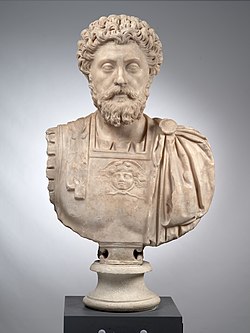Marcus Aurelius Quote
How good it is when you have roast meat or suchlike foods before you, to impress on your mind that this is the dead body of a fish, this is the dead body of a bird or pig; and again, that the Falernian wine is the mere juice of grapes, and your purple edged robe simply the hair of a sheep soaked in shell-fish blood!And in sexual intercourse that it is no more than the friction of a membrane and a spurt of mucus ejected. How good these perceptions are at getting to the heart of the real thing and penetrating through it, so you can see it for what it is!This should be your practice throughout all your life: when things have such a plausible appearance, show them naked, see their shoddiness, strip away their own boastful account of themselves.Vanity is the greatest seducer of reason: when you are most convinced that your work is important, that is when you are most under its spell.
How good it is when you have roast meat or suchlike foods before you, to impress on your mind that this is the dead body of a fish, this is the dead body of a bird or pig; and again, that the Falernian wine is the mere juice of grapes, and your purple edged robe simply the hair of a sheep soaked in shell-fish blood!And in sexual intercourse that it is no more than the friction of a membrane and a spurt of mucus ejected. How good these perceptions are at getting to the heart of the real thing and penetrating through it, so you can see it for what it is!This should be your practice throughout all your life: when things have such a plausible appearance, show them naked, see their shoddiness, strip away their own boastful account of themselves.Vanity is the greatest seducer of reason: when you are most convinced that your work is important, that is when you are most under its spell.
Related Quotes
About Marcus Aurelius
Marcus Aurelius was the son of the praetor Marcus Annius Verus and his wife, Domitia Calvilla. He was related through marriage to the emperors Trajan and Hadrian. Marcus was three when his father died, and was raised by his mother and paternal grandfather. After Hadrian's adoptive son, Aelius Caesar, died in 138, Hadrian adopted Marcus's uncle Antoninus Pius as his new heir. In turn, Antoninus adopted Marcus and Lucius, the son of Aelius. Hadrian died that year, and Antoninus became emperor. Now heir to the throne, Marcus studied Greek and Latin under tutors such as Herodes Atticus and Marcus Cornelius Fronto. He married Antoninus's daughter Faustina in 145.
After Antoninus died in 161, Marcus acceded to the throne alongside his adoptive brother, who took the regnal name Lucius Aurelius Verus. Under the reign of Marcus Aurelius, the Roman Empire witnessed much military conflict. In the East, the Romans fought the Parthian war of Lucius Verus with a revitalised Parthian Empire and the rebel Kingdom of Armenia. Marcus defeated the Marcomanni, Quadi, and Sarmatian Iazyges in the Marcomannic Wars. These and other Germanic peoples began to represent a troubling reality for the Empire. He reduced the silver purity of the Roman currency, the denarius. The persecution of Christians in the Roman Empire appears to have increased during his reign, although his involvement is unlikely since there are no Christian sources ascribing him the blame, and he was praised by Justin Martyr and Tertullian. The Antonine Plague broke out in 165 or 166 and devastated the population of the Roman Empire, causing the deaths of five to ten million people. Lucius Verus may have died from the plague in 169. When Marcus himself died in 180, he was succeeded by his son Commodus.
Commodus' succession after Marcus has been a subject of debate among both contemporary and modern historians. The Column of Marcus Aurelius and Equestrian Statue of Marcus Aurelius still stand in Rome, where they were erected in celebration of his military victories. As a philosopher, his work Meditations is one of the most important sources for the modern understanding of ancient Stoic philosophy. These writings have been praised by fellow writers, philosophers, monarchs, and politicians centuries after his death.
